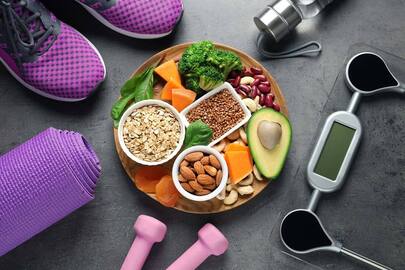
Jada Sayles
Health and nutrition are things that we learn about from an early age. We learn to eat our fruits and vegetables and to not eat certain foods that are bad for us. Nutrition is particularly important for growing children as well as students and staying healthy has a significant impact on academic performance, especially during adolescent years. As teenagers we develop habits that lead into our adult years, these habits can be good or bad, but the most important thing is our health. Creating healthy habits as an adolescent that carry on to adulthood is especially important because taking care of our health helps us live long healthy lives.
Environment plays an influential role in someone’s health “I work at a fast-food restaurant and that's my main source of food so like that’s the only place I go to eat" (Courtney Parks). Living in an area where the only accessible food is fast food and foods with low nutritional value subjects certain people to have more health problems and less diversity in their diets. The ideal audience for nutrition education is adolescents, since it would be more challenging to change ingrained habits in adults. Adolescents may also influence their classmates, families, and other community members in addition to adopting good eating habits and lifestyles for themselves.
"In my opinion, a healthy diet consists of fruits, veggies, proteins, and water" (Shani Lofton). Having a balanced diet as an adolescent creates a good habit that will carry on through your adulthood, however creating bad habits like frequently eating unhealthy foods and large quantities of food will negatively affect your adulthood. There are many things that adolescents do that they don’t understand can have harmful consequences, "I think overeating is a big one. Many people don't know that they're overeating or don't portion out their foods which can cause obesity" (Shani Lofton).
The lack of nutritional information being taught in schools is one of the most significant causes of adolescent obesity, "I think firstly we should try to portion out all of our food, especially school lunches. We need to work towards healthier options, also we don't have the calories on many foods that we eat but I think that we could do better teaching health and nutrition because it doesn't help students become aware of how important nutrition is and how to eat healthy" (Shani Lofton).
Learning about how the foods we eat affect us would serve a great purpose for adolescents, we could teach students how to stay healthy and the importance of exercise. Some things adolescents can do to stay healthy are eating three meals a day with nutritional snacks in between, drinking enough water, and decreasing artificial sugar intake. All these things can help you and your family stay healthy.
Health and nutrition are things that we learn about from an early age. We learn to eat our fruits and vegetables and to not eat certain foods that are bad for us. Nutrition is particularly important for growing children as well as students and staying healthy has a significant impact on academic performance, especially during adolescent years. As teenagers we develop habits that lead into our adult years, these habits can be good or bad, but the most important thing is our health. Creating healthy habits as an adolescent that carry on to adulthood is especially important because taking care of our health helps us live long healthy lives.
Environment plays an influential role in someone’s health “I work at a fast-food restaurant and that's my main source of food so like that’s the only place I go to eat" (Courtney Parks). Living in an area where the only accessible food is fast food and foods with low nutritional value subjects certain people to have more health problems and less diversity in their diets. The ideal audience for nutrition education is adolescents, since it would be more challenging to change ingrained habits in adults. Adolescents may also influence their classmates, families, and other community members in addition to adopting good eating habits and lifestyles for themselves.
"In my opinion, a healthy diet consists of fruits, veggies, proteins, and water" (Shani Lofton). Having a balanced diet as an adolescent creates a good habit that will carry on through your adulthood, however creating bad habits like frequently eating unhealthy foods and large quantities of food will negatively affect your adulthood. There are many things that adolescents do that they don’t understand can have harmful consequences, "I think overeating is a big one. Many people don't know that they're overeating or don't portion out their foods which can cause obesity" (Shani Lofton).
The lack of nutritional information being taught in schools is one of the most significant causes of adolescent obesity, "I think firstly we should try to portion out all of our food, especially school lunches. We need to work towards healthier options, also we don't have the calories on many foods that we eat but I think that we could do better teaching health and nutrition because it doesn't help students become aware of how important nutrition is and how to eat healthy" (Shani Lofton).
Learning about how the foods we eat affect us would serve a great purpose for adolescents, we could teach students how to stay healthy and the importance of exercise. Some things adolescents can do to stay healthy are eating three meals a day with nutritional snacks in between, drinking enough water, and decreasing artificial sugar intake. All these things can help you and your family stay healthy.

